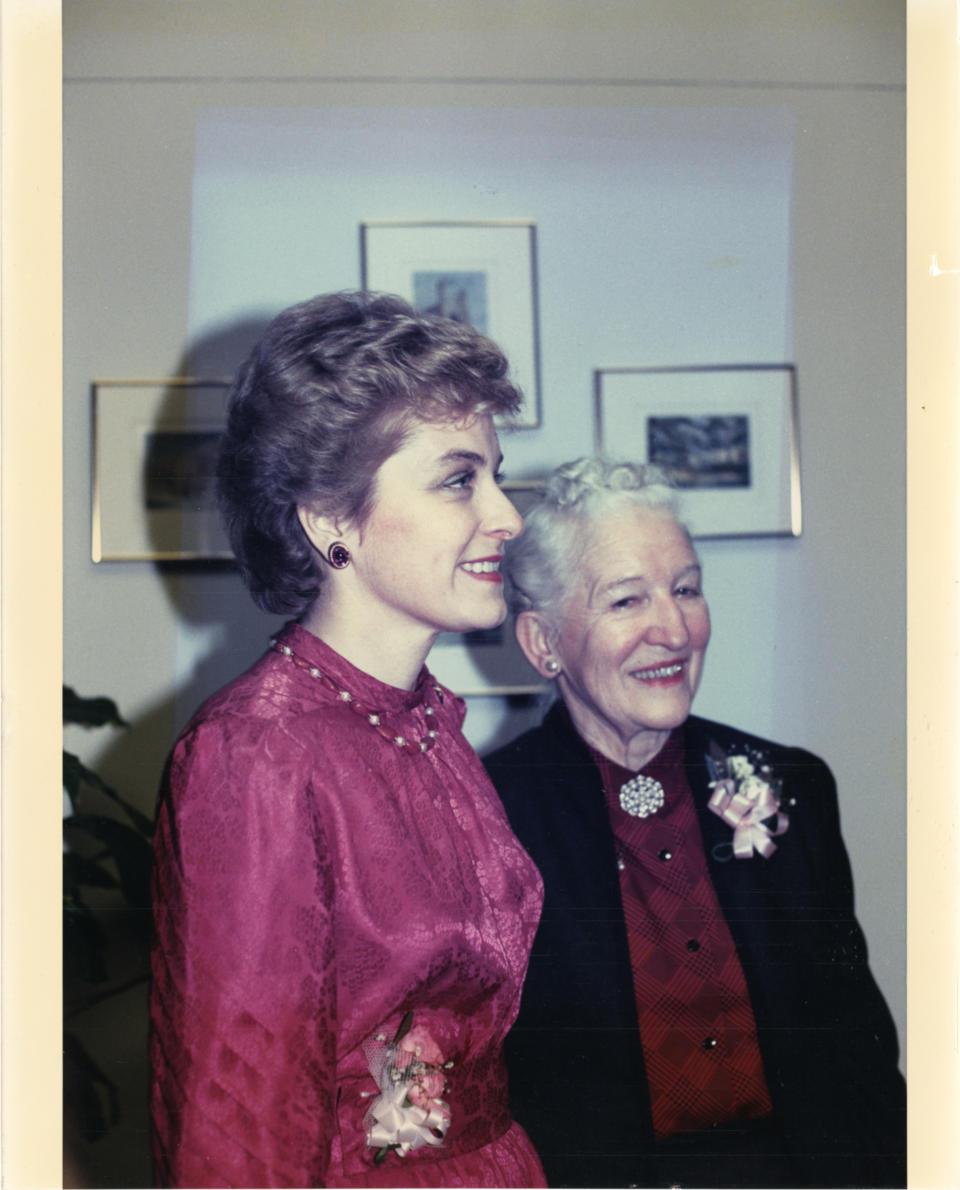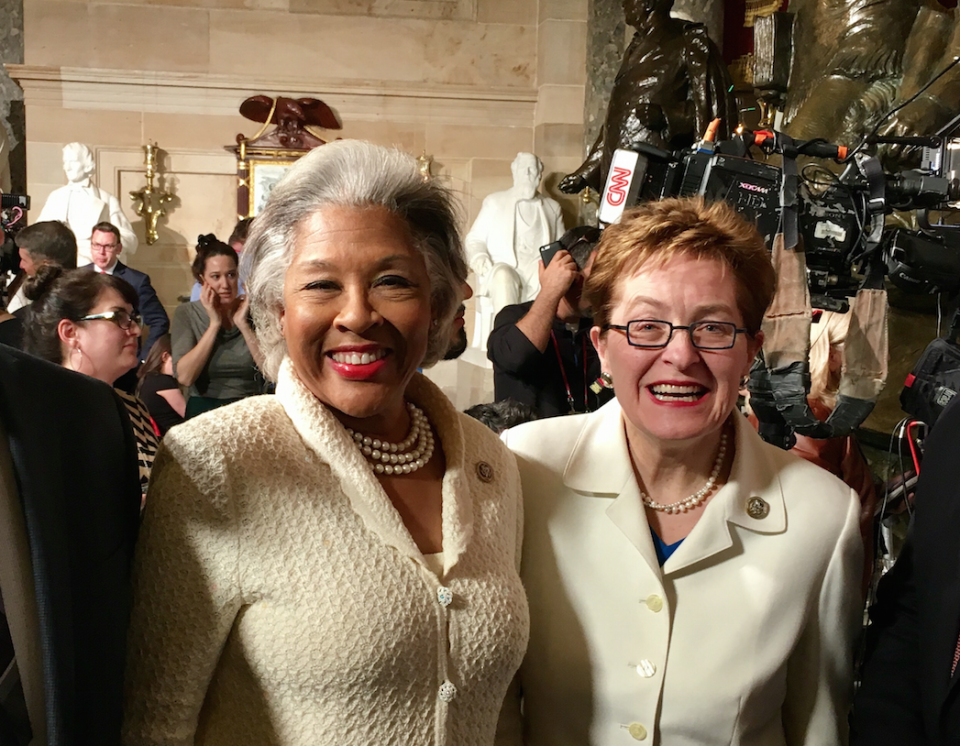Rep. Marcy Kaptur Financed Her First Congressional Race With Bake Sales

The statistics aren't good. According to recent estimates, women make up just under 20 percent of Congress and less than 25 percent of all state legislatures. Only six of our nation's governors are women. But we are 51 percent of the population. And the research shows that when women participate in government, we make it run better, more collaboratively. Historically, women have needed to be convinced to enter politics. But within weeks of the 2016 presidential election, thousands of women announced they plan to run. And we want them to win. So we're giving them a weekly example of a woman who has run and won. The point: You can, too.
Rep. Marcy Kaptur (D–OH) was elected to the House of Representatives in 1982, making her the longest-serving women currently in the chamber. She has won reelection 17 times and served her constituents for more than three decades. No matter what happens, she insists she'll always be "just" a working-class girl-and damn proud of it.
Going way, way, way back, I wanted to be a cowgirl. I didn't live on a ranch, but I loved the hat and the boots. I liked the idea being in nature and riding horses, [though] we never owned a horse. I grew up in an era when John Kennedy was president. I happen to be Roman Catholic and seeing him elected as the first Roman Catholic really mattered. I took Kennedy's words seriously: "Ask not what your country can do for you; ask what you can do for your country."
For high school, I attended St. Ursula Academy, an all-girls school taught by Catholic sisters. And for the first 12 years of my education, I had only women teachers. You can't undervalue what they gave to us; they lived at poverty levels and they educated the children of the working class. When I was first elected to Congress, I found that many of the women I was serving with had been educated in Catholic or all-girls schools. I think those were very empowering experiences.

Back then, no one in my family had ever graduated from high school, and certainly not from college. But my father knew about the Notre Dame football team in South Bend, Indiana, so I applied there. I was rejected because I was a woman, and they didn't admit women in those days. How was I supposed to know that? Then I applied to the Air Force Academy. There was this show on television that I loved in which this guy and his niece would fly everywhere in the West. And I was rejected there, also because I was a woman. I didn't know that they didn't accept women. And then I applied to the FBI, thinking I could go to college and also get ready for the FBI, and I was told, no, they don't admit women. All that has changed.
For the first third of my career, I was focused on what I could to do to help rebuild American cities. I eventually served President Carter as an urban advisor. After he lost his reelection, I decided I wanted to teach. I enrolled at MIT to get my doctorate. Over the holidays, I went back home. Ronald Reagan had just been elected. I went to the supermarket with my mother, and I ran into one of the women I had gone to grade school with. I shouted, "Hey, Bernadette, how are you?" And she started to cry. She was behind the meat counter, and she began to tell me how difficult life was. She had gotten custody of one of her grandchildren. There was illness in the family. She was a working woman, just trying to hold it all together.
I knew the Democratic Party had been seeking someone to run for Congress, and a couple of my friends had asked if I would consider it. I didn't think I could afford to run. I would need $200,000, and I said, "That's more than our family and all our relatives are worth put together!" I just laughed it off. But when I talked with my friend, I really started to think about it. I had run other people's campaigns. I knew what the issues were. I'd never seen unemployment so high. I decided to reconsider.
I withdrew from my final semester at MIT. I drove a U-Haul back from Cambridge, full of all my stuff. I drove in the snow for 17 hours to get back home. I thought, If I can do this, I can do anything.
People made fun of me because I did bake sales to raise money.
It was very, very hard. People made fun of me because I did bake sales to raise money, and that wasn't within the paradigm that they viewed as acceptable. I handed out nail files to campaign, which no one liked either. But in my district, I knew people used nail files not only for fingernails, but to sharpen fishing hooks. I knew mechanics put them in their toolboxes. I felt Washington was so blind to what mattered to the people that I wanted to represent.

I was running to represent a labor community and all the major unions, they were all headed by men. They had to meet me first and they sort of went, "Oh my God, a woman!" But as they got to know me, they understood I was one of them, and they endorsed me. People knew my parents; they knew my family. We were not wealthy people, but we had a lot of friends.
So many people campaigned for me. My high school friends, my girlfriends, my grade-school friends, my teachers-they all helped. My brother put up hundreds of yard signs. Eventually I had 1,000 volunteers. We worked extremely hard. And I just knew a lot of people. I had been a city planner in my community for several years, so people knew me. I had been active in the Democratic Party since I was 13! But the only two people in office, I think, who believed I could win and actually helped were Congresswoman Shirley Chisholm and Congresswoman Mary Rose Oakar. Everyone else ignored me.
The day after I was elected, the chairman of the Democratic Congressional Campaign Committee, which had never put a dime in to help me, called me and said, "Oh, Congresswomen Kaptur! We are so proud of you, and congratulations. You know what? I looked in my briefcase, and I found an envelope I should have mailed to you." A few days later, he sent me $5,000. Can you believe that? But I didn't care; we won with the people. It was the people and the community that I grew up in that elected me, and that has remained true throughout the years.

Back then, our leaders were mostly working-class men, and I got along very well with them. Everyone was very respectful, very welcoming. The men made me feel at home. They made me feel like a working-class girl from Toledo, Ohio, could make a contribution. Now, was I invited to their card games? No.
If you feel you're going to cry or you feel like you don't have your full breath, you stand in a military posture.
And of course, the women members especially welcomed me, Congresswomen Barbara Mikulski, Mary Rose Oakar, Lindy Boggs. I got to know women who taught me that if you feel you're going to cry or you feel like you don't have your full breath, you stand in a military posture. You put your shoulders back. You stand up straight. And the urge to cry will pass. Trust me; it works!

This is what I can promise: I will always represent my constituents, working-class people. My agenda is shaped by what is happening to the people of my district, the conditions of their lives. It always has been. And I'm heavily led by that, which is why I've opposed presidents in both parties. I stood up to Bill Clinton, especially on jobs and trade. And after George W. Bush was elected, he came to my district first. First! I was opposed to the economic regime he was imposing on places that I represent. In the early 2000s, he brought the president of Mexico with him to try to embarrass me, and all I can tell you is it didn't work. The people of my district stood with me. And they continue to stand with me.
The truth is, I surprise myself when I look back! But I feel good. I know a lot now. I know I can be effective. I haven't set any limits on myself; I don't think anyone should. Next year I will pass the mark as the longest-serving woman in the history of the House. And if you'd asked me when I started, did I even think that was possible, I don't even know what I would have said: Really, who could imagine?
This interview has been edited and condensed.
You Might Also Like

